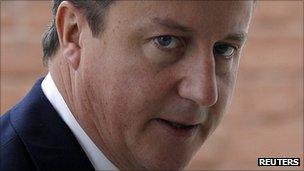Mr Cameron, GDP and the hole in the recovery
- Published
- comments
Stephanie Flanders: "We've been growing so slowly, every little hurts"
The economic hole left by the recession is even deeper than we thought, and the prime minister's advisers think the best way we climb out of it is to spend less. That would be one summary of this morning's events.
This morning we were told - by nearly every broadcaster and newspaper - that David Cameron wants us all to repay our debts. That will have been unwelcome news to retailers - not to mention the Bank of England, whose low interest rate policy relies on households and companies doing exactly the opposite.
His advisors now say journalists who were given a preview of his party conference speech misunderstood what he planned to say. His critics will say it is the government that misunderstands the nature of this economic recovery.
Save more
This was the line from his speech that was circulated yesterday: "The only way out of a debt crisis is to deal with your debts. That means households - all of us - paying off the credit card and store card bills."
I am told that the wording will now be changed, to make clear the prime minister is making a "statement of fact", that households "are paying off" these bills. He is not exhorting them to do so.
Either way, this battle of words goes to the heart of an increasingly global debate about the best way to achieve growth in an economy in which everyone - governments, households, and companies - would all like to borrow less and save more.
Let me say a few words about those new GDP figures, before returning to the larger theme. The ONS today shaved 0.1% from their earlier estimates of UK growth in the first and second quarter of 2011, leaving the growth rate in the second quarter just barely positive, at 0.1%. The implication is that the economy is no larger now than it was in the third quarter of 2010.
In more normal times, a revision of just 0.1% of GDP would not seem like a big deal. But, as the boss of Tesco probably wouldn't say, when you're growing this slowly, every little hurts.
Deeper recession
There is little in today's figures to suggest our economic situation is radically worse than we previously thought. But nor is there anything to make us feel more upbeat.

Mr Cameron's advisers said journalists misunderstood his comments about household debt
More significant are the revisions going further back. Armed with fresh data, the ONS has taken another look at what happened to the economy before and during the recession: they now think growth was a bit stronger in the first years of the 21st century, but the recession itself was deeper, with a total drop in output of 7.1%, not 6.4% as previously thought.
Some will say there is a silver lining there, because it might suggest the economy now had more spare capacity - room to grow - in the future, without triggering inflation. By the same token, they might suggest that the case for more quantitative easing by the Bank of England is that much stronger. That is certainly how many city economists have interpreted the figures.
However, looking at what has happened to employment, productivity and inflation in the past year, there will be some - Andrew Sentance, perhaps - who would conclude exactly the opposite; that the trade-off between growth and inflation has deteriorated even further than we thought.
I've debated this question many times here (see my posts of 15 June and 19 September). Let's just say, if there is a lot of spare capacity out there, it is hiding itself well. And companies seem to be in no rush to find it.
More borrowing
This takes us back to the big argument, inadvertently highlighted in the debate over the prime minister's party conference speech.
You can't get out of a crisis caused by excessive public and private sector borrowing with a further increase in government borrowing. That is the German government's view, well demonstrated by its approach to the economic troubles of Italy, Portugal and Greece. It is also David Cameron's and George Osborne's view.
As we know, Ed Balls sees things very differently. So do the likes of Paul Krugman and the FT commentator Martin Wolf. Strange though it may sound, they believe the only way to recover from a financial crisis caused by excessive debt may indeed be for the government to borrow more.
Because if everyone - governments, households and companies - simultaneously tries to save more, that effort will be self-defeating. The result will be economic stagnation, or something rather worse.
In fact, the Office for Budget Responsibility's forecasts - on which Mr Cameron's economic strategy depends - show household debt ratios going up over the next few years. As a matter of basic arithmetic, if the government is to borrow less over the next few years, then British companies and households, and/or foreign ones, have to spend more if the UK economy is to continue to grow.
The official line out of Number 10 is now that the prime minister was suggesting government should "show the lead" in reducing its borrowing. He was not suggesting we should all rush to follow. But the Bank of England, for one, would be quite concerned if we did.